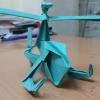Search Results
Showing results 621 to 640 of 1480

Vibrating Pennies
Source Institutions
Conduct a simple experiment to explore how temperature changes can make things expand or contract.

Bubble Suspension
Source Institutions
In this activity, learners observe as soap bubbles float on a cushion of carbon dioxide gas. Learners blow bubbles into an aquarium filled with a slab of dry ice.
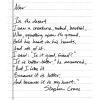
Handwriting Analysis
Source Institutions
In this forensics activity, students will explore the methods that investigators use to confirm the authenticity of handwriting.

Carbon Cycle Poster
Source Institutions
In this activity, learners gain knowledge about how carbon moves through all four of the Earth’s major spheres (biosphere, hydrosphere, atmosphere, and lithosphere), and understand how humans influenc

Static Electricity
Source Institutions
In this activity, learners will explore ways static electricity interacts with the surroundings of an object. The activity has step-by-step instructions in English and Navajo.
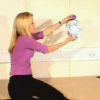
Extra Bounce
Source Institutions
In this indoor or outdoor demonstration, use a large and small ball to illustrate conservation of energy and momentum.

Tube Zither
Source Institutions
In this activity, learners explore sound by constructing tube zithers, stringed instruments from Southeast Asia and the South Pacific.

What am I?
Source Institutions
In this activity, learners examine nanoscale structures of common things.

Shrinking Coin
Source Institutions
In this demonstration, learners attempt to get a large coin through a small hole, the size of a smaller coin.

Water Engineering
Source Institutions
In this activity, learners will engineer a water irrigation system. Learners will create a ditch irrigation system -- or an acequia-- to move water with the help of gravity.

Test the Finger Wrinkle Hypothesis
Source Institutions
Learners create a tool to measure how well they grip a wet object when their fingers are smooth versus wrinkly. Are smooth or wrinkly fingers better at holding on to the object?
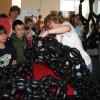
Balloon Nanotubes Tabletop
Source Institutions
This activity introduces learners to the structure and properties of carbon nanotubes.
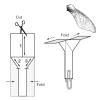
Helicopters
Source Institutions
In this activity, learners will observe how air interacts with a paper helicopter. Learners will test different variables of weight, size, and shape.

Let's Bag It
Learners observe and discuss a vacuum cleaner as a model of a baghouse, a device used in cleaning industrial air pollution.

Aerogel
Source Institutions
This activity/demo introduces learners to aerogel, a glass nanofoam. Learners discover how aerogel is made and how well it insulates as well as learn about aerogel's other unique properties.

Flower Power
Source Institutions
In this activity, learners will experiment with changing flower colors. Learners will investigate the effects of acids and bases on flower colors.

Counting Your Lucky Stars
Source Institutions
In this activity, learners sample a star field to estimate the number of stars in the universe.

Assemble the Human Heart
Source Institutions
In this online activity about anatomy, learners will drag and drop pieces of the heart into their proper positions and explore what function each part of the heart has.
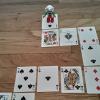
Coding Algorithms
Source Institutions
In this activity, learners will code an algorithm to make it through a maze.

